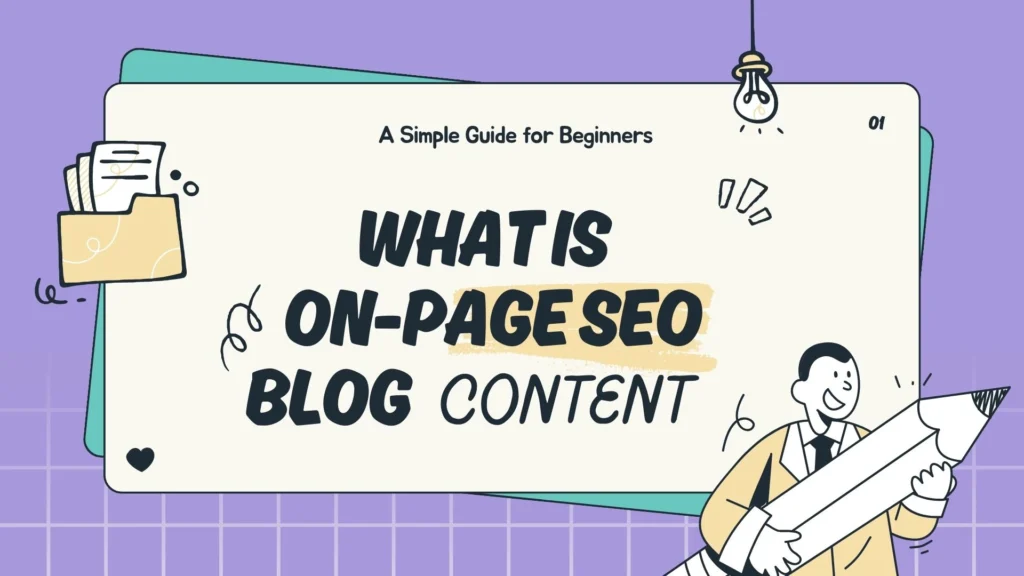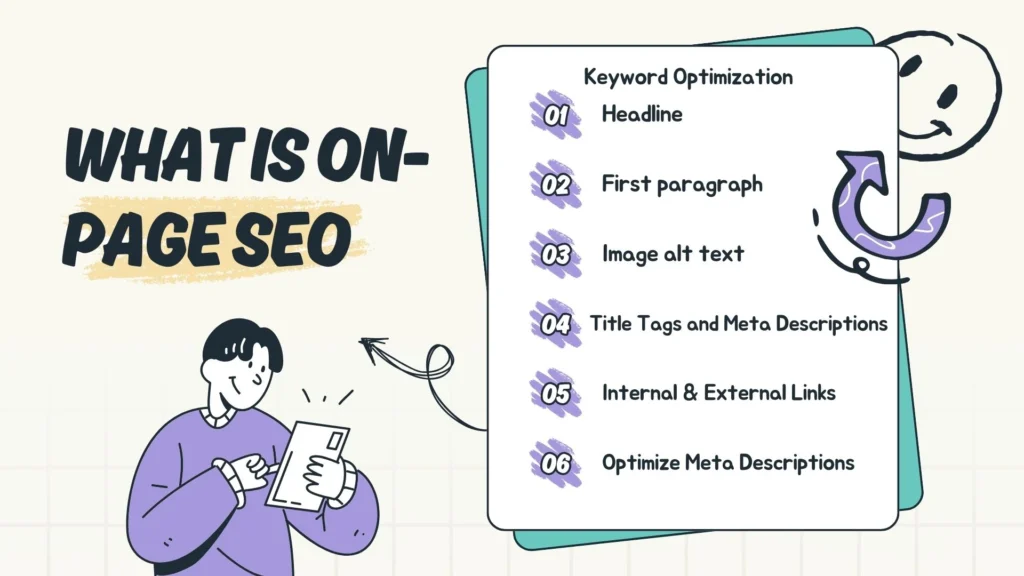What exactly is on-page SEO?
What is On-page SEO means – preparing every page of your website in such a way that the easiest search engines like Google understand what is on our page. When a user searches for a related topic, your page will explain us.”
“How to improve the content inside your page – such as making the content useful, keeping headings clean, optimizing images, and pointing to the right place. All these links from your website are not only useful for the content inside your page, but also give Google a strong signal that your page is on topic.”

This includes everything you directly control on your website, such as:
- The words you use (content)
- Your titles and headings
- Images
- Links between your pages How your URLs are written
When certain things in your home are in the right place – like a rack for your shoes or a shelf – your home feels cleaner and easier to understand. Similarly, when you set up your website pages properly – it’s easier for Google to figure out which page is for what purpose.
Why does on-page SEO matter?
Search engines don’t randomly pick websites to show on the first page — they use smart rules (called algorithms) to figure out which content is the most helpful and well-structured.
- If your web page:
- is easy to read
- is full of useful information
- is well organized
If the keyword is in the right place, not only will Google understand your site quickly, but the reader will also easily know what you have written about
Why on-page SEO is important
It helps search engines understand your content When your website loads quickly, runs smoothly on mobile, and is easy to read, every visitor has a great experience. Key Elements of On-Page SEO Let’s understand the key components that make on-page SEO effective:

Keyword Optimization
Choose the right keywords that people are actually searching for. Add them naturally in:
- Headline
- First paragraph
- Headline
- Image alt text
- Conclusion Title Tags and Meta Descriptions
Title tag: The title tag is what appears in blue at the top of a Google search. It is best to keep it short, clear, and with your main keyword.
Meta description is a short description of your web page that appears in search results and tells the user what to find inside. Keep your description brief, but interesting – so users stop and read while scrolling.
- H1 = main heading (use only once)
- H2 = subheading
- H3 = point under subheading
Internal Linking:
Add links to other pages within your website. This helps users find more content and keeps them on your site longer. Example: If you are writing about SEO, you can link to another blog on “Keyword Research”.
URL Structure:
Keep your page URLs short, clean, and descriptive. Avoid random numbers or symbols.
Example: – yoursite.com/page?id=234(wrong hai)
yoursite.com/on-page-seo-guide
Image Optimization:
Add images that relate to your content to keep your reader engaged and help you understand the information better.
- Compress image for faster loading
- Use meaningful alternative text for SEO
Quality Content:
Content is still the most important thing in SEO. Write helpful, original, and engaging content that answers the user’s question. Avoid copied or thin content. Use:
- Simple language
- Bullet points
- Short paragraphs
- Real examples
Benefits of Good On-Page SEO:-
- Higher search engine rankings
- More information on your site
- Better user experience
- Working bounce creators
- More leads and conversions
- Helpful On-Page SEO Tools
- Yoast SEO (for WordPress)
- Google Search Console
- Ubersuggest
- Screaming Frog SEO Spider

Clean, optimized pages rank faster and better – find out why
When someone searches online, your website is often their first experience with your brand. But it’s not just about looks – if you want your site to rank on Google, it must also be fast, mobile-friendly, and SEO-optimized. An excellent design grabs attention. A great structure is research institute.You’ve probably heard this line before:
“Clean, optimized pages rank faster and better.” You must be wondering what does it mean? Come, here are the meanings in simple and straight forward words.
What do we mean by “clean, optimized pages”?
A clean page means:
- On-Page SEO is free from unnecessary clutter
- On-Page SEO loads fast
- On-Page SEO is easy to read
- An optimized page means:
- On-Page SEO follows basic SEO practices
- On-Page SEO uses the right keywords On-Page SEO has
Google has only one goal – the user will find their answer quickly and clearly. If your website is outdated, the text is hard to understand or the layout is broken, no matter how good it is, ignore using Google. Here’s how a clean and optimized page helps
Faster page loads = better rankings
Websites that load faster give a better user experience. Google also knows that every second is precious in the Internet world – that’s why it ranks sites that load faster higher. Clean pages (without heavy code or large images) load faster and keep users happy.
Easier for Google to understand
When your website uses proper headings (H1, H2, H3), well-written meta descriptions and organized content, Google can easily understand what your page is about – which increases your chances of ranking higher.
Mobile-friendly design
Most users these days search from mobile devices. Clean and optimized pages adjust well to any screen size, making them more mobile-friendly – another big ranking factor in Google’s eyes.
Better user experience
Imagine someone visits your site and the page takes time to load or the information is confusing – they will immediately leave instead of staying.. But if your site is clean and easy to navigate, users will stay longer – and that shows Google that your content is useful.
Better internal linking and structure
Optimized pages include proper internal links and organized content sections. It helps: Users explore more content Search engines crawl your site more easily
Tools to check page optimization
You can use the following tools to check and improve your website
- Google PageSpeed Insights
- GTmetrix
- Yoast SEO (for WordPress)
- Ubersuggest
- Google Mobile-Friendly Test
- Conclusion
Just like the first page of a book engages the reader, on-page SEO determines the first impression of a website.. Without it, your website might exist – but it won’t be visible. When you set up your content, headings, keywords and page layout a little smartly, your website is liked by Google and is also easy to understand for users.
Why do clean and optimized pages rank faster?
Final Thoughts
If you want to win in the world of digital marketing, you can’t ignore the basics. Clean, optimized pages not only make your website look professional, but also help you rank faster and higher on Google.
